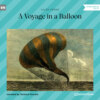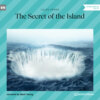Czytaj książkę: «Twenty Thousand Leagues Under the Sea», strona 2
CHAPTER III: I FORM MY RESOLUTION
Three seconds before the arrival of J. B. Hobson's letter I no more thought of pursuing the unicorn than of attempting the passage of the North Sea. Three seconds after reading the letter of the honourable Secretary of Marine, I felt that my true vocation, the sole end of my life, was to chase this disturbing monster and purge it from the world.
But I had just returned from a fatiguing journey, weary and longing for repose. I aspired to nothing more than again seeing my country, my friends, my little lodging by the Jardin des Plantes, my dear and precious collections - but nothing could keep me back! I forgot all - fatigue, friends and collections - and accepted without hesitation the offer of the American Government.
"Besides," thought I, "all roads lead back to Europe; and the unicorn may be amiable enough to hurry me towards the coast of France. This worthy animal may allow itself to be caught in the seas of Europe (for my particular benefit), and I will not bring back less than half a yard of his ivory halberd to the Museum of Natural History." But in the meanwhile I must seek this narwhal in the North Pacific Ocean, which, to return to France, was taking the road to the antipodes.
"Conseil," I called in an impatient voice.
Conseil was my servant, a true, devoted Flemish boy, who had accompanied me in all my travels. I liked him, and he returned the liking well. He was quiet by nature, regular from principle, zealous from habit, evincing little disturbance at the different surprises of life, very quick with his hands, and apt at any service required of him; and, despite his name, never giving advice - even when asked for it.
Conseil had followed me for the last ten years wherever science led. Never once did he complain of the length or fatigue of a journey, never make an objection to pack his portmanteau for whatever country it might be, or however far away, whether China or Congo. Besides all this, he had good health, which defied all sickness, and solid muscles, but no nerves; good morals are understood. This boy was thirty years old, and his age to that of his master as fifteen to twenty. May I be excused for saying that I was forty years old?
But Conseil had one fault: he was ceremonious to a degree, and would never speak to me but in the third person, which was sometimes provoking.
"Conseil," said I again, beginning with feverish hands to make preparations for my departure.
Certainly I was sure of this devoted boy. As a rule, I never asked him if it were convenient for him or not to follow me in my travels; but this time the expedition in question might be prolonged, and the enterprise might be hazardous in pursuit of an animal capable of sinking a frigate as easily as a nutshell. Here there was matter for reflection even to the most impassive man in the world. What would Conseil say?
"Conseil," I called a third time.
Conseil appeared.
"Did you call, sir?" said he, entering.
"Yes, my boy; make preparations for me and yourself too. We leave in two hours."
"As you please, sir," replied Conseil, quietly.
"Not an instant to lose; lock in my trunk all travelling utensils, coats, shirts, and stockings - without counting, as many as you can, and make haste."
"And your collections, sir?" observed Conseil.
"They will keep them at the hotel."
"We are not returning to Paris, then?" said Conseil.
"Oh! certainly," I answered, evasively, "by making a curve."
"Will the curve please you, sir?"
"Oh! it will be nothing; not quite so direct a road, that is all. We take our passage in the Abraham, Lincoln."
"As you think proper, sir," coolly replied Conseil.
"You see, my friend, it has to do with the monster - the famous narwhal. We are going to purge it from the seas. A glorious mission, but a dangerous one! We cannot tell where we may go; these animals can be very capricious. But we will go whether or no; we have got a captain who is pretty wide-awake."
Our luggage was transported to the deck of the frigate immediately. I hastened on board and asked for Commander Farragut. One of the sailors conducted me to the poop, where I found myself in the presence of a good-looking officer, who held out his hand to me.
"Monsieur Pierre Aronnax?" said he.
"Himself," replied I. "Commander Farragut?"
"You are welcome, Professor; your cabin is ready for you."
I bowed, and desired to be conducted to the cabin destined for me.
The Abraham Lincoln had been well chosen and equipped for her new destination. She was a frigate of great speed, fitted with high-pressure engines which admitted a pressure of seven atmospheres. Under this the Abraham Lincoln attained the mean speed of nearly eighteen knots and a third an hour - a considerable speed, but, nevertheless, insufficient to grapple with this gigantic cetacean.
The interior arrangements of the frigate corresponded to its nautical qualities. I was well satisfied with my cabin, which was in the after part, opening upon the gunroom.
"We shall be well off here," said I to Conseil.
"As well, by your honour's leave, as a hermit-crab in the shell of a whelk," said Conseil.
I left Conseil to stow our trunks conveniently away, and remounted the poop in order to survey the preparations for departure.
At that moment Commander Farragut was ordering the last moorings to be cast loose which held the Abraham Lincoln to the pier of Brooklyn. So in a quarter of an hour, perhaps less, the frigate would have sailed without me. I should have missed this extraordinary, supernatural, and incredible expedition, the recital of which may well meet with some suspicion.
But Commander Farragut would not lose a day nor an hour in scouring the seas in which the animal had been sighted. He sent for the engineer.
"Is the steam full on?" asked he.
"Yes, sir," replied the engineer.
"Go ahead," cried Commander Farragut.
CHAPTER IV: NED LAND
Captain Farragut was a good seaman, worthy of the frigate he commanded. His vessel and he were one. He was the soul of it. On the question of the monster there was no doubt in his mind, and he would not allow the existence of the animal to be disputed on board. He believed in it, as certain good women believe in the leviathan - by faith, not by reason. The monster did exist, and he had sworn to rid the seas of it. Either Captain Farragut would kill the narwhal, or the narwhal would kill the captain. There was no third course.
The officers on board shared the opinion of their chief. They were ever chatting, discussing, and calculating the various chances of a meeting, watching narrowly the vast surface of the ocean. More than one took up his quarters voluntarily in the cross-trees, who would have cursed such a berth under any other circumstances. As long as the sun described its daily course, the rigging was crowded with sailors, whose feet were burnt to such an extent by the heat of the deck as to render it unbearable; still the Abraham Lincoln had not yet breasted the suspected waters of the Pacific. As to the ship's company, they desired nothing better than to meet the unicorn, to harpoon it, hoist it on board, and despatch it. They watched the sea with eager attention.
Besides, Captain Farragut had spoken of a certain sum of two thousand dollars, set apart for whoever should first sight the monster, were he cabin-boy, common seaman, or officer.
I leave you to judge how eyes were used on board the Abraham Lincoln.
For my own part I was not behind the others, and, left to no one my share of daily observations. The frigate might have been called the Argus, for a hundred reasons. Only one amongst us, Conseil, seemed to protest by his indifference against the question which so interested us all, and seemed to be out of keeping with the general enthusiasm on board.
I have said that Captain Farragut had carefully provided his ship with every apparatus for catching the gigantic cetacean. No whaler had ever been better armed. We possessed every known engine, from the harpoon thrown by the hand to the barbed arrows of the blunderbuss, and the explosive balls of the duck-gun. On the forecastle lay the perfection of a breech-loading gun, very thick at the breech, and very narrow in the bore, the model of which had been in the Exhibition of 1867. This precious weapon of American origin could throw with ease a conical projectile of nine pounds to a mean distance of ten miles.
Thus the Abraham Lincoln wanted for no means of destruction; and, what was better still she had on board Ned Land, the prince of harpooners.
Ned Land was a Canadian, with an uncommon quickness of hand, and who knew no equal in his dangerous occupation. Skill, coolness, audacity, and cunning he possessed in a superior degree, and it must be a cunning whale to escape the stroke of his harpoon.
Ned Land was about forty years of age; he was a tall man (more than six feet high), strongly built, grave and taciturn, occasionally violent, and very passionate when contradicted. His person attracted attention, but above all the boldness of his look, which gave a singular expression to his face.
Who calls himself Canadian calls himself French; and, little communicative as Ned Land was, I must admit that he took a certain liking for me. My nationality drew him to me, no doubt. It was an opportunity for him to talk, and for me to hear, that old language of Rabelais, which is still in use in some Canadian provinces. The harpooner's family was originally from Quebec, and was already a tribe of hardy fishermen when this town belonged to France.
Little by little, Ned Land acquired a taste for chatting, and I loved to hear the recital of his adventures in the polar seas. He related his fishing, and his combats, with natural poetry of expression; his recital took the form of an epic poem, and I seemed to be listening to a Canadian Homer singing the Iliad of the regions of the North.
I am portraying this hardy companion as I really knew him. We are old friends now, united in that unchangeable friendship which is born and cemented amidst extreme dangers. Ah, brave Ned! I ask no more than to live a hundred years longer, that I may have more time to dwell the longer on your memory.
Now, what was Ned Land's opinion upon the question of the marine monster? I must admit that he did not believe in the unicorn, and was the only one on board who did not share that universal conviction. He even avoided the subject, which I one day thought it my duty to press upon him. One magnificent evening, the 30th July (that is to say, three weeks after our departure), the frigate was abreast of Cape Blanc, thirty miles to leeward of the coast of Patagonia. We had crossed the tropic of Capricorn, and the Straits of Magellan opened less than seven hundred miles to the south. Before eight days were over the Abraham Lincoln would be ploughing the waters of the Pacific.
Seated on the poop, Ned Land and I were chatting of one thing and another as we looked at this mysterious sea, whose great depths had up to this time been inaccessible to the eye of man. I naturally led up the conversation to the giant unicorn, and examined the various chances of success or failure of the expedition. But, seeing that Ned Land let me speak without saying too much himself, I pressed him more closely.
"Well, Ned," said I, "is it possible that you are not convinced of the existence of this cetacean that we are following? Have you any particular reason for being so incredulous?"
The harpooner looked at me fixedly for some moments before answering, struck his broad forehead with his hand (a habit of his), as if to collect himself, and said at last, "Perhaps I have, Mr. Aronnax."
"But, Ned, you, a whaler by profession, familiarised with all the great marine mammalia - YOU ought to be the last to doubt under such circumstances!"
"That is just what deceives you, Professor," replied Ned. "As a whaler I have followed many a cetacean, harpooned a great number, and killed several; but, however strong or well-armed they may have been, neither their tails nor their weapons would have been able even to scratch the iron plates of a steamer."
"But, Ned, they tell of ships which the teeth of the narwhal have pierced through and through."
"Wooden ships - that is possible," replied the Canadian, "but I have never seen it done; and, until further proof, I deny that whales, cetaceans, or sea-unicorns could ever produce the effect you describe."
"Well, Ned, I repeat it with a conviction resting on the logic of facts. I believe in the existence of a mammal power fully organised, belonging to the branch of vertebrata, like the whales, the cachalots, or the dolphins, and furnished with a horn of defence of great penetrating power."
"Hum!" said the harpooner, shaking his head with the air of a man who would not be convinced.
"Notice one thing, my worthy Canadian," I resumed. "If such an animal is in existence, if it inhabits the depths of the ocean, if it frequents the strata lying miles below the surface of the water, it must necessarily possess an organisation the strength of which would defy all comparison."
"And why this powerful organisation?" demanded Ned.
"Because it requires incalculable strength to keep one's self in these strata and resist their pressure. Listen to me. Let us admit that the pressure of the atmosphere is represented by the weight of a column of water thirty-two feet high. In reality the column of water would be shorter, as we are speaking of sea water, the density of which is greater than that of fresh water. Very well, when you dive, Ned, as many times 32 feet of water as there are above you, so many times does your body bear a pressure equal to that of the atmosphere, that is to say, 15 lb. for each square inch of its surface. It follows, then, that at 320 feet this pressure equals that of 10 atmospheres, of 100 atmospheres at 3,200 feet, and of 1,000 atmospheres at 32,000 feet, that is, about 6 miles; which is equivalent to saying that if you could attain this depth in the ocean, each square three-eighths of an inch of the surface of your body would bear a pressure of 5,600 lb. Ah! my brave Ned, do you know how many square inches you carry on the surface of your body?"
"I have no idea, Mr. Aronnax."
"About 6,500; and as in reality the atmospheric pressure is about 15 lb. to the square inch, your 6,500 square inches bear at this moment a pressure of 97,500 lb."
"Without my perceiving it?"
"Without your perceiving it. And if you are not crushed by such a pressure, it is because the air penetrates the interior of your body with equal pressure. Hence perfect equilibrium between the interior and exterior pressure, which thus neutralise each other, and which allows you to bear it without inconvenience. But in the water it is another thing."
"Yes, I understand," replied Ned, becoming more attentive; "because the water surrounds me, but does not penetrate."
"Precisely, Ned: so that at 32 feet beneath the surface of the sea you would undergo a pressure of 97,500 lb.; at 320 feet, ten times that pressure; at 3,200 feet, a hundred times that pressure; lastly, at 32,000 feet, a thousand times that pressure would be 97,500,000 lb. - that is to say, that you would be flattened as if you had been drawn from the plates of a hydraulic machine!"
"The devil!" exclaimed Ned.
"Very well, my worthy harpooner, if some vertebrate, several hundred yards long, and large in proportion, can maintain itself in such depths - of those whose surface is represented by millions of square inches, that is by tens of millions of pounds, we must estimate the pressure they undergo. Consider, then, what must be the resistance of their bony structure, and the strength of their organisation to withstand such pressure!"
"Why!" exclaimed Ned Land, "they must be made of iron plates eight inches thick, like the armoured frigates."
"As you say, Ned. And think what destruction such a mass would cause, if hurled with the speed of an express train against the hull of a vessel."
"Yes... certainly... perhaps," replied the Canadian, shaken by these figures, but not yet willing to give in.
"Well, have I convinced you?"
"You have convinced me of one thing, sir, which is that, if such animals do exist at the bottom of the seas, they must necessarily be as strong as you say."
"But if they do not exist, mine obstinate harpooner, how explain the accident to the Scotia?"
CHAPTER V: AT A VENTURE
The voyage of the Abraham Lincoln was for a long time marked by no special incident. But one circumstance happened which showed the wonderful dexterity of Ned Land, and proved what confidence we might place in him.
The 30th of June, the frigate spoke some American whalers, from whom we learned that they knew nothing about the narwhal. But one of them, the captain of the Monroe, knowing that Ned Land had shipped on board the Abraham Lincoln, begged for his help in chasing a whale they had in sight. Commander Farragut, desirous of seeing Ned Land at work, gave him permission to go on board the Monroe. And fate served our Canadian so well that, instead of one whale, he harpooned two with a double blow, striking one straight to the heart, and catching the other after some minutes' pursuit.
Decidedly, if the monster ever had to do with Ned Land's harpoon, I would not bet in its favour.
The frigate skirted the south-east coast of America with great rapidity. The 3rd of July we were at the opening of the Straits of Magellan, level with Cape Vierges. But Commander Farragut would not take a tortuous passage, but doubled Cape Horn.
The ship's crew agreed with him. And certainly it was possible that they might meet the narwhal in this narrow pass. Many of the sailors affirmed that the monster could not pass there, "that he was too big for that!"
The 6th of July, about three o'clock in the afternoon, the Abraham Lincoln, at fifteen miles to the south, doubled the solitary island, this lost rock at the extremity of the American continent, to which some Dutch sailors gave the name of their native town, Cape Horn. The course was taken towards the north-west, and the next day the screw of the frigate was at last beating the waters of the Pacific.
"Keep your eyes open!" called out the sailors.
And they were opened widely. Both eyes and glasses, a little dazzled, it is true, by the prospect of two thousand dollars, had not an instant's repose.
I myself, for whom money had no charms, was not the least attentive on board. Giving but few minutes to my meals, but a few hours to sleep, indifferent to either rain or sunshine, I did not leave the poop of the vessel. Now leaning on the netting of the forecastle, now on the taffrail, I devoured with eagerness the soft foam which whitened the sea as far as the eye could reach; and how often have I shared the emotion of the majority of the crew, when some capricious whale raised its black back above the waves! The poop of the vessel was crowded on a moment. The cabins poured forth a torrent of sailors and officers, each with heaving breast and troubled eye watching the course of the cetacean. I looked and looked till I was nearly blind, whilst Conseil kept repeating in a calm voice:
"If, sir, you would not squint so much, you would see better!"
But vain excitement! The Abraham Lincoln checked its speed and made for the animal signalled, a simple whale, or common cachalot, which soon disappeared amidst a storm of abuse.
But the weather was good. The voyage was being accomplished under the most favourable auspices. It was then the bad season in Australia, the July of that zone corresponding to our January in Europe, but the sea was beautiful and easily scanned round a vast circumference.
The 20th of July, the tropic of Capricorn was cut by 105d of longitude, and the 27th of the same month we crossed the Equator on the 110th meridian. This passed, the frigate took a more decided westerly direction, and scoured the central waters of the Pacific. Commander Farragut thought, and with reason, that it was better to remain in deep water, and keep clear of continents or islands, which the beast itself seemed to shun (perhaps because there was not enough water for him! suggested the greater part of the crew). The frigate passed at some distance from the Marquesas and the Sandwich Islands, crossed the tropic of Cancer, and made for the China Seas. We were on the theatre of the last diversions of the monster: and, to say truth, we no longer LIVED on board. The entire ship's crew were undergoing a nervous excitement, of which I can give no idea: they could not eat, they could not sleep - twenty times a day, a misconception or an optical illusion of some sailor seated on the taffrail, would cause dreadful perspirations, and these emotions, twenty times repeated, kept us in a state of excitement so violent that a reaction was unavoidable.
And truly, reaction soon showed itself. For three months, during which a day seemed an age, the Abraham Lincoln furrowed all the waters of the Northern Pacific, running at whales, making sharp deviations from her course, veering suddenly from one tack to another, stopping suddenly, putting on steam, and backing ever and anon at the risk of deranging her machinery, and not one point of the Japanese or American coast was left unexplored.
The warmest partisans of the enterprise now became its most ardent detractors. Reaction mounted from the crew to the captain himself, and certainly, had it not been for the resolute determination on the part of Captain Farragut, the frigate would have headed due southward. This useless search could not last much longer. The Abraham Lincoln had nothing to reproach herself with, she had done her best to succeed. Never had an American ship's crew shown more zeal or patience; its failure could not be placed to their charge - there remained nothing but to return.
This was represented to the commander. The sailors could not hide their discontent, and the service suffered. I will not say there was a mutiny on board, but after a reasonable period of obstinacy, Captain Farragut (as Columbus did) asked for three days' patience. If in three days the monster did not appear, the man at the helm should give three turns of the wheel, and the Abraham Lincoln would make for the European seas.
This promise was made on the 2nd of November. It had the effect of rallying the ship's crew. The ocean was watched with renewed attention. Each one wished for a last glance in which to sum up his remembrance. Glasses were used with feverish activity. It was a grand defiance given to the giant narwhal, and he could scarcely fail to answer the summons and "appear."
Two days passed, the steam was at half pressure; a thousand schemes were tried to attract the attention and stimulate the apathy of the animal in case it should be met in those parts. Large quantities of bacon were trailed in the wake of the ship, to the great satisfaction (I must say) of the sharks. Small craft radiated in all directions round the Abraham Lincoln as she lay to, and did not leave a spot of the sea unexplored. But the night of the 4th of November arrived without the unveiling of this submarine mystery.
The next day, the 5th of November, at twelve, the delay would (morally speaking) expire; after that time, Commander Farragut, faithful to his promise, was to turn the course to the south-east and abandon for ever the northern regions of the Pacific.
The frigate was then in 31° 15' N. lat. and 136° 42' E. long. The coast of Japan still remained less than two hundred miles to leeward. Night was approaching. They had just struck eight bells; large clouds veiled the face of the moon, then in its first quarter. The sea undulated peaceably under the stern of the vessel.
At that moment I was leaning forward on the starboard netting. Conseil, standing near me, was looking straight before him. The crew, perched in the ratlines, examined the horizon which contracted and darkened by degrees. Officers with their night glasses scoured the growing darkness: sometimes the ocean sparkled under the rays of the moon, which darted between two clouds, then all trace of light was lost in the darkness.
In looking at Conseil, I could see he was undergoing a little of the general influence. At least I thought so. Perhaps for the first time his nerves vibrated to a sentiment of curiosity.
"Come, Conseil," said I, "this is the last chance of pocketing the two thousand dollars."
"May I be permitted to say, sir," replied Conseil, "that I never reckoned on getting the prize; and, had the government of the Union offered a hundred thousand dollars, it would have been none the poorer."
"You are right, Conseil. It is a foolish affair after all, and one upon which we entered too lightly. What time lost, what useless emotions! We should have been back in France six months ago."
"In your little room, sir," replied Conseil, "and in your museum, sir; and I should have already classed all your fossils, sir. And the Babiroussa would have been installed in its cage in the Jardin des Plantes, and have drawn all the curious people of the capital!"
"As you say, Conseil. I fancy we shall run a fair chance of being laughed at for our pains."
"That's tolerably certain," replied Conseil, quietly; "I think they will make fun of you, sir. And, must I say it...?"
"Go on, my good friend."
"Well, sir, you will only get your deserts."
"Indeed!"
"When one has the honour of being a _savant_ as you are, sir, one should not expose one's self to..."
Conseil had not time to finish his compliment. In the midst of general silence a voice had just been heard. It was the voice of Ned Land shouting:
"Look out there! The very thing we are looking for - on our weather beam!"




















